The Benefits of Pursuing a 4-Year College Degree
If you are a high school graduate planning to attend college or someone having doubts if proceeding and/or continuing with higher education is worth it, knowing the benefits of college degrees is a must.
In this article, I will discuss thoroughly the benefits that bachelor’s degree holders reap from proceeding with a college education! I’ve also included the top degrees that are actually worth it!
What is a College Degree?

A college degree, also known as a bachelor’s degree, is the golden ticket to unlocking a world of opportunities and opening doors to a successful future. It represents the culmination of years of hard work, dedication, and intellectual growth. A college degree is not merely a piece of paper but a testament to one’s knowledge, skills, and expertise in a particular field of study.
Having a college major signifies a commitment to higher learning, critical thinking, and the acquisition of specialized knowledge. With a college degree in hand, individuals possess a powerful tool that can propel them towards fulfilling careers, higher earning potential, and personal fulfilment.
Whether you’re pursuing a degree in engineering, political science, or liberal arts, a college degree is the gateway to a world of endless possibilities and boundless opportunities for success.
Examples of Some Bachelor’s Degrees That Are Definitely Worth It
Listed below are the most common degrees that require specific skills but more money in the long run.
Nursing
A degree in nursing is not only a great career choice but also a noble and rewarding profession. Nurses play a crucial role in the healthcare system, providing compassionate care, promoting health, and advocating for patients. This degree enables you to gain comprehensive knowledge in anatomy, physiology, pharmacology, and patient care techniques.
The demand for nurses is consistently high, making it a secure and stable career path. Additionally, nursing offers diverse opportunities, including specialization in areas such as pediatrics, critical care, or mental health. Nursing degrees provide hands-on clinical experience, fostering skills in critical thinking, problem-solving, and teamwork. By enrolling in a nursing program, you enter a fulfilling profession where you can make a positive impact on the lives of others.
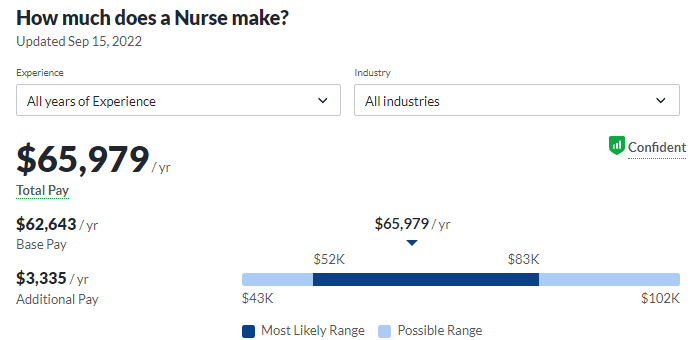
With an average annual salary of $65,979 and a whole lot of job opportunities anywhere in the world, being a nurse is always a good plan anywhere and anytime here in this world we live in!
Computer Science Majors
In today’s digital era, a degree in computer science opens up a world of exciting and lucrative opportunities. Computer science majors study programming languages, algorithms, software development, and computer systems. With this degree, you can pursue careers in software engineering, data analysis, artificial intelligence, cybersecurity, and more.
The demand for computer science professionals continues to grow, offering job security and a wide range of career options. Additionally, computer science graduates often enjoy competitive salaries and the potential for advancement. By enrolling in a computer science program, you equip yourself with the skills and knowledge needed to thrive in the ever-evolving technology industry.
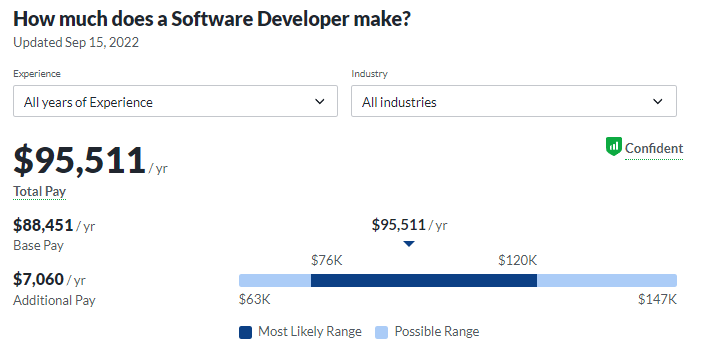
With an annual average salary of $95,511 which is just a few thousand short of becoming a 6 figure deal, software developers are the agents of this world’s modern technological changes!
Electrical Engineering
Electrical engineering is an excellent degree choice for those fascinated by technology and its applications. This field focuses on the study of electricity, electronics, and electromagnetism. With an electrical engineering degree, you gain expertise in designing, analyzing, and implementing electrical systems and components.
Electrical engineers play a vital role in industries such as power generation, telecommunications, robotics, and renewable energy. This degree offers a broad skill set that includes circuit design, signal processing, control systems, and programming. With a bachelor’s degree in the electrical engineering program, you position yourself for a dynamic and in-demand career, contributing to advancements in technology and innovation.
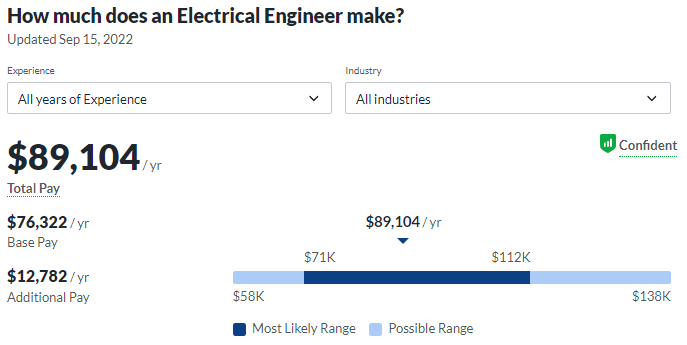
To have a college education in electrical engineering is truly worth it when the estimated annual salary is $89,104!
Civil Engineering
Students enrolled in civil engineering are ideal for those who have a passion for designing and constructing infrastructure that shapes our daily lives. Civil engineers are involved in the planning, design, and construction of various structures, including buildings, roads, bridges, and water systems. This field combines technical knowledge with creativity and problem-solving skills.
The bachelor’s degree in civil engineering cover subjects like structural analysis, geotechnical engineering, transportation systems, and environmental engineering. With a civil engineering degree, you can work in the public or private sectors, contributing to sustainable urban development, transportation networks, and environmental preservation. By enrolling in a civil engineering program, you gain the expertise to tackle complex engineering challenges and leave a lasting impact on society.
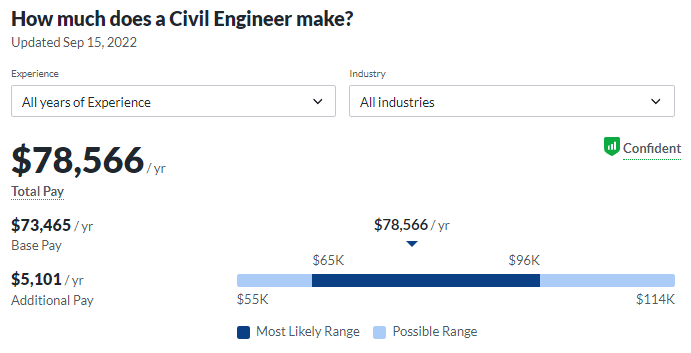
College graduates that chose the civil engineering path not only have a decent job market awaiting them but also an average annual salary of $78,566. That’s great pay for a very remarkable job!
Information Technology
In today’s digital landscape, information technology (IT) has become an integral part of nearly every industry. A bachelor’s degree in information technology equips students interested in this degree with the skills to manage and leverage technology effectively. IT professionals are responsible for the design, implementation, and maintenance of computer systems, networks, and software solutions.
With an IT degree, you can pursue careers in areas such as systems analysis, network administration, cybersecurity, or database management. This field offers a diverse range of opportunities and allows for specialization in various IT domains. By enrolling in an IT program, you position yourself for a dynamic career that combines technical expertise with problem-solving and innovation, driving digital transformation in organizations.
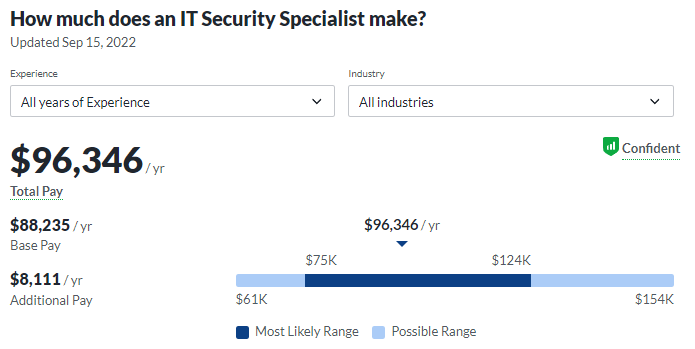
Having a college education and choosing the field of information technology is a smart move! With the constant advancement in technology in today’s world and an average annual salary of $96,346, your hard work and financial investment will be worth it in the long run!
Here’s a video about the 8 highest-paying bachelor degrees:
What Are The Benefits of College Degrees?

With many benefits that you can think of, let’s dig deeper into the most common benefits of college degrees awaiting future and recent graduates!
Increased Access to Job Opportunities
Many employers require a minimum level of education as a prerequisite for employment and some even require a master’s degree for a small competitive advantage! Earning a college degree opens up a world of possibilities when it comes to job opportunities.
With a college degree, you gain a competitive edge in the job application process whether on-site or those job opportunities posted online, as it demonstrates your commitment, knowledge, and dedication to your field of study. Moreover, a college degree provides you with a broader skill set and a deeper understanding of your chosen field, making you eligible for a wider range of positions and increasing your chances of securing meaningful and fulfilling employment.
Increased Earning Potential
One of the most appealing benefits of a college degree is the potential for increased earning potential. On average, individuals with a college degree tend to earn higher salaries compared to those without one.
The specialized knowledge and skills acquired during your college education make you a valuable asset to employers, positioning you for higher-paying positions. Over the course of your career, the gap in earning potential between individuals with and without a college degree can be significant. By investing in your education, you are investing in your financial future and setting yourself up for greater financial stability and success.
Higher Job Satisfaction
A college degree not only enhances your earning potential but also contributes to higher job satisfaction. When you have a deeper understanding of your field and possess the necessary skills to excel in your profession, you are more likely to enjoy your work.
College education equips you with the knowledge and expertise to tackle challenges, make meaningful contributions, and advance in your career. This sense of competence and fulfillment leads to increased job satisfaction, as you feel more engaged, motivated, and fulfilled in your professional life.
Preparation for a Specialized Career
One of the primary advantages of earning a college degree is the preparation it provides for a specialized career. Whether you aspire to be a doctor, engineer, educator, or entrepreneur, a college degree equips you with the necessary knowledge and skills to succeed in your chosen field.
Through rigorous coursework, hands-on experience, and exposure to industry professionals, you gain the expertise required to excel in a specific profession. A college degree ensures that you are well-prepared and qualified to meet the demands and challenges of your desired career path, setting you up for long-term success.
Networking Opportunities
Attending college provides abundant networking opportunities that can significantly impact your professional growth. College campuses are vibrant communities where you have the chance to interact with fellow students, professors, and professionals in various fields.
These connections can lead to valuable mentorship, internships, job opportunities, and collaborations. Building a strong professional network during your college years can open doors to new possibilities, help you stay informed about industry trends, and provide a support system throughout your career.
Personal Development and Improved Self-Esteem
Beyond the academic and career benefits, a college degree fosters personal development and improved self-esteem. College students undergo 4 years of transformative experience that expands their knowledge, hones critical thinking skills, and encourages personal growth.
Through exposure to diverse perspectives, challenging coursework, and extracurricular activities, you develop a deeper understanding of yourself and the world around you. The accomplishments and milestones achieved during your college journey contribute to a sense of pride and confidence in your abilities, boosting your self-esteem and empowering you to pursue your goals with conviction.
Positive Return on Investment
While pursuing a college degree requires a significant investment of time, effort, and finances, it often yields a positive return on investment. From having bigger future earnings, a higher income on a monthly basis, and all the other realistic reasons that make college worth it!
By considering the potential returns, you can view a college degree as a wise investment in your future that will continue to pay dividends throughout your career. Not all degrees can offer you the most splendid things in life, so get your priorities straight first before choosing a degree!
Economic and Job Stability
A college degree provides a strong foundation for economic and job stability. In today’s ever-evolving and competitive job market, having a college degree offers a level of security and stability. During economic downturns or industry fluctuations, individuals with postsecondary education are generally better equipped to navigate through challenging times and they are rightfully rewarded with great employment benefits.
They have acquired specialized skills and knowledge that are in demand across various sectors, making them more adaptable and resilient. Logically speaking, individuals with higher education are more likely to be employed and experience lower unemployment rates compared to those without a degree. By investing in a college education, you enhance your prospects for long-term economic stability and job security.
Increased Marketability
A college degree significantly enhances your marketability to employers. It showcases your commitment to personal growth, a strong work ethic, and the ability to successfully complete a challenging program of study. With these facts in mind, more upward mobility becomes highly probable in your career!
These hard skills are transferable to a wide range of industries, making you an attractive candidate for employers seeking well-rounded individuals. Moreover, many employers consider a college degree as a minimum qualification for entry-level positions and a prerequisite for career advancement. By holding a college degree, you distinguish yourself from other candidates, increasing your chances of landing desirable job opportunities and advancing in your chosen field.

Challenges of Pursuing a College Degree
Bachelor’s degree holders will usually tell you the path to a diploma is never easy. Aside from the benefits of college degrees, let’s discuss further the challenges a person might face when he or she aims to be a college graduate in the future.
Financial Strain
One of the most common challenges in pursuing a college degree is the financial strain it can impose. Tuition fees, textbooks, living expenses, and other related costs can accumulate quickly, putting a significant burden on students and their families. Many students have to navigate loans, scholarships, part-time jobs, or other financial aid options to afford their education.
Degree holders that had to take on student loans will already have a deductible amount awaiting on their pay slips. Balancing financial responsibilities while focusing on studies can be a daunting task for many.
Time Management and Workload Management
College life often requires students to juggle multiple responsibilities simultaneously. Balancing coursework, assignments, exams, extracurricular activities, part-time jobs, and personal commitments can be overwhelming. Effective time management becomes crucial to stay on top of academic responsibilities while maintaining a healthy work-life balance. Adjusting to the demanding schedule and learning to prioritize tasks efficiently can be a challenge for students transitioning from high school to college.
Academic and Peer Pressure
College is generally more rigorous and demanding than high school. The increased workload, complex assignments, and higher expectations can create academic pressure. Students may face challenges in adapting to the new learning environment, meeting strict deadlines, and managing the academic workload effectively. The pressure to perform well academically and maintain good grades can be stressful and impact overall well-being.
Social Adjustments and the Necessity to Travel Far From Your Hometown
College is a time of significant social transitions for many students. Moving away from home, meeting new people from diverse backgrounds, and adjusting to a different social environment can be challenging. Building new friendships, finding a sense of belonging, and navigating social dynamics can take time and effort. Students may also experience homesickness and feelings of isolation initially. Developing a support system and engaging in campus activities can help ease this transition.
Mental Health and Stress
The demands of college life can lead to increased stress and mental health challenges. Academic pressures, social adjustments, financial concerns, and the pressure to succeed can take a toll on students’ mental well-being. It is essential to recognize the signs of stress, anxiety, and depression and seek support when needed. Colleges often provide resources such as counseling services and student support programs to help students navigate these challenges and prioritize their mental health.
Key Takeaways About the Benefits of College Degrees
In conclusion, college graduates and their college degrees hold immense value in today’s society. A college experience remains a worthwhile investment that opens doors to various opportunities especially when the students gain the skills of time management, interpersonal skills, and all other key factors to be a well-rounded professional.
While there may be a disconnect between college education and the job market, it is essential to recognize the importance of a well-rounded education that goes beyond just technical skills. A high school diploma will not be enough to put you in front of the race! A college degree will easily outweigh a high school education and a high school diploma! College grads are viewed as people that are ready for the future career awaiting them and their bachelor’s degree is proof that they are ready for such responsibilities.
The job market may continue to evolve, but the value of a college degree remains constant. It is a testament to an individual’s commitment to education, their capacity to learn, and their potential to make a meaningful impact. By embracing the opportunities and challenges that come with a college degree, graduates can navigate the ever-changing landscape and emerge as resilient, well-rounded individuals ready to shape the future.

… [Trackback]
[…] Info to that Topic: shanehummus.com/college-degrees/benefits-of-college-degrees/ […]
… [Trackback]
[…] Find More to that Topic: shanehummus.com/college-degrees/benefits-of-college-degrees/ […]
… [Trackback]
[…] Find More on that Topic: shanehummus.com/college-degrees/benefits-of-college-degrees/ […]
… [Trackback]
[…] Read More Info here on that Topic: shanehummus.com/college-degrees/benefits-of-college-degrees/ […]
… [Trackback]
[…] Information to that Topic: shanehummus.com/college-degrees/benefits-of-college-degrees/ […]
… [Trackback]
[…] Info to that Topic: shanehummus.com/college-degrees/benefits-of-college-degrees/ […]
… [Trackback]
[…] Find More here on that Topic: shanehummus.com/college-degrees/benefits-of-college-degrees/ […]
… [Trackback]
[…] Find More to that Topic: shanehummus.com/college-degrees/benefits-of-college-degrees/ […]
… [Trackback]
[…] Here you can find 90135 more Information to that Topic: shanehummus.com/college-degrees/benefits-of-college-degrees/ […]
… [Trackback]
[…] Read More on that Topic: shanehummus.com/college-degrees/benefits-of-college-degrees/ […]
… [Trackback]
[…] Information on that Topic: shanehummus.com/college-degrees/benefits-of-college-degrees/ […]
… [Trackback]
[…] Read More on on that Topic: shanehummus.com/college-degrees/benefits-of-college-degrees/ […]
… [Trackback]
[…] Find More here to that Topic: shanehummus.com/college-degrees/benefits-of-college-degrees/ […]
… [Trackback]
[…] Read More Info here on that Topic: shanehummus.com/college-degrees/benefits-of-college-degrees/ […]
… [Trackback]
[…] There you can find 38789 more Information on that Topic: shanehummus.com/college-degrees/benefits-of-college-degrees/ […]
… [Trackback]
[…] Read More to that Topic: shanehummus.com/college-degrees/benefits-of-college-degrees/ […]
… [Trackback]
[…] Find More Information here on that Topic: shanehummus.com/college-degrees/benefits-of-college-degrees/ […]
… [Trackback]
[…] Find More Info here on that Topic: shanehummus.com/college-degrees/benefits-of-college-degrees/ […]
… [Trackback]
[…] Find More Information here on that Topic: shanehummus.com/college-degrees/benefits-of-college-degrees/ […]
… [Trackback]
[…] Read More on that Topic: shanehummus.com/college-degrees/benefits-of-college-degrees/ […]